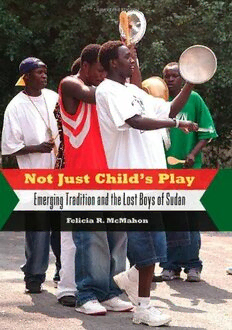
Not Just Child’s Play: Emerging Tradition and the Lost Boys of Sudan PDF
239 Pages·2007·3.386 MB·English
Most books are stored in the elastic cloud where traffic is expensive. For this reason, we have a limit on daily download.
Preview Not Just Child’s Play: Emerging Tradition and the Lost Boys of Sudan
Description:
Felicia R. McMahon breaks new ground in the presentation and analysis of emerging traditions of the \"Lost Boys,\" a group of parentless youths who fled Sudan under tragic circumstances in the 1990s. With compelling insight, McMahon analyzes the oral traditions of the DiDinga Lost Boys, about whom very little is known. Her vibrant ethnography provides intriguing details about the performances and conversations of the young DiDinga in Syra-cuse, New York. It also offers important insights to scholars and others who work with refugee groups. The author argues that the playful traditions she describes constitute a strategy by which these young men proudly po-sition themselves as pre-servers of DiDinga culture and as harbingers of social change rather than as victims of war. Drawing ideas from folklore, linguistics, drama, and play theory, the author documents the danced songs of this unique group. Her inclusion of original song lyrics translated by the singers and descriptions of conversations convey the voices of the young men. Well researched and carefully developed, this book makes an original contribution to our understanding of refugee populations and tells a compelling story at the same time. Felicia R. McMahon is a research professor in anthropology at Syracuse University. A former Fulbright Scholar, she has published in several folklore journals and is the coeditor of Children's Folklore: A Sourcebook, which won an American Folklore Society Opie Prize for Best Edited Book.
See more
The list of books you might like
Most books are stored in the elastic cloud where traffic is expensive. For this reason, we have a limit on daily download.
